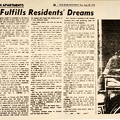Rocky Mountain News
Sunday March 27, 1977
Disabled are limited by society's attitudes
By Alan Cunningham
PHOTO by John Gordon, News: A young man (Larry Ruiz) sits in a wheelchair in front of a building. The shot shows his whole body and wheelchair and is looking up at Larry's smiling face. (For those who knew Larry, it's a classic Larry smile.)
Caption reads: Larry Ruiz is one of those leading better lives of the Atlantis community.
Nobody seems to know exactly how many disabled Americans there are - or even how one should define them.
In Colorado, the figures are even more sketchy than they are nationally. But one estimate, based on federal statistics, suggests there may be as many as 350,000 disabled citizens in this state. If true, that would mean that 14 percent of the population suffers from some disability.
The same projection indicates that as many as 83,000 of these persons as unable to work, keep house or go to school.
Gov. Dick Lamm sometimes uses a more conservative figure of 10 percent. But even if that is closer to the truth, it shows that the plight of the disabled is a major problem.
It also offers a clue as to why the disabled seem sure to emerge soon as the country's newest civil rights lobby. The have the numbers to make themselves heard - and seen - if they can begin to speak out with a unified voice, demanding their fair share of the American Pie.
Until now, they've suffered the fate of most minority groups: invisibility. This is ironic, since most are highly visible if anyone chooses to see them. But for many reasons - not the least a sense of guilt - the able-bodied tend to turn away from those with crutches, wheelchairs and seeing eye dogs.
And those who plan public facilities and services often reflect this attitude. It is politically safe for them to ignore the needs of the disabled pretending such persons make up a tiny fraction of the population and thus don't deserve a major share of attention.
A myth to be sure. But it is only one of several myths which the Atlantis community, a group home for handicapped persons, in a minority report to the upcoming White House Conference on Handicapped individuals, hopes to destroy.
For instance, there is the idea that nursing homes are primarily heavens for the aged and the infirm. The opposite side of that assumption is set forth in the opening chapter of the Atlantis report.
Few realize that our nation's institutions also house a great many disabled young persons, some in their early teens.
THESE ARE THE victims of our society's response to children and young adults who have muscular dystrophy, cerebral palsy, birth defects, blindness, and neurological disorders, or have survived accidents of varying kinds. But they are there by the thousands, many simply because they were labeled by physicians and psychologists as "retarded" and unable to function normally.
It is difficult to imagine a more stifling or inappropriate atmosphere for a young person. It is inhumane to shackle and imprison youthful energy and curiosity into the nursing home routine.
Such repressive living leads to anger, hostility and finally to the withdrawal and waste of a battered ego.
As the report goes on to explain, the Atlantis group has fought to get more than 30 young men and women out of nursing homes and institutions so as to demonstrate that they can reverse this pattern if given a chance. But, even as it begins to reverse, new problems emerge.
Most have to do with obstacles which the world has placed in the way of the disabled person. Again, it has a lot do with society's tendency to act as if he doesn't exist.
Funds for rehabilitation programs, both public and private, are so scarce that only a small fraction of the disabled ever benefit from them. A prime example of this comes from State Rehabilitation Director Glenn Crawford, who says his division has determined that 135,000 persons in Colorado are potentially eligible for its services.
Yet, in 1976, the division served about 14,300 persons. The figure will inch its way up to 16,000 this year.
Such private facilities as the widely acclaimed Craig Hospital also have finite resources. They apply guidelines to decide which applicants will be accepted and which won't.
Needless to say, a lawyer whose only disability is the loss of his legs has a better chance than a 19-year-old with no schooling who has lain on his back for most of his life.
Funds and facilities for handicapped scarce
Those who don't get the help often wind up in the category that Wade Blank of Atlantis refers to as "the losers." He contends that those who work with the disabled have too quickly given up on this group of people consigning them to lives of hopelessness.
And he further argues that the implications of this have narrowed opportunities not only for the severely disabled, but for many others with less serious problems. For even those who have escaped the awful label of the "loser" run into obstacles every day.
The Atlantis report focuses on many of these obstacles. These are some of the observations:
EDUCATION. Many disabled youngsters in the past have failed to get adequate schooling either because they were in institutions or because their families assumed they would never be able to lead normal lives as adults and consequently didn't need to be trained for careers.
Even those who went to school often were sidelined into special programs for the handicapped. While academic standards were high in such programs, the students were poorly prepared either intellectually or emotionally, to get along in a world of able-bodied persons.
The recommended solution, "mainstreaming"- that is, letting disabled youngsters and adults go to school in the same classroom with everyone else.
MONEY. The complexities of the various welfare programs on the county, state and federal level often conspire to keep disabled persons in nursing homes.
Counties often find they have to pay more money if a man or woman is living in his own apartments, or in a facility, such as Atlantis, than they do if he or she is in a nursing home. That's because the federal government pays the bulk of the nursing home fee.
Likewise, assistance payments are cut off if a disabled person earns more than a pittance in a month's time. The cutoff can be as low as $65.
The "maximum level of income"from federal state and county assistance payments is $185. This means many disabled persons are living below the poverty level as it has been defined for other underprivileged groups.
The solution as viewed by those who put together the Atlantis report, is to simplify and integrate the complicated payments system. But even more important, to increase payments so that everyone gets the same amount of money whether he is in an institution or out.
TRANSPORTATION. The report talks about a number of things here including electric wheelchairs and curb cuts, but is main statement under this heading is that bus systems such as the Regional Transportation District (RTD) should become fully accessible to the disabled.
RTD, it contends, has been unresponsive to the needs of disabled would be riders for transportation to work, school and for pleasure trips. Even the special HandiRide service - which RTD often boasts is a frontrunner in the nation - is given poor marks.
LAWS. [not legible...]
Colorado concerning the disabled in general and the severely physically disabled in particular, the report states.
Furthermore, it is not realistic to think that the disabled will get effective legislation passed without having government officials sensitized to the disabled's problems.
This may already be changing. Largely due to lobbying by Atlantis, hearings were underway in the General Assembly this week on two bills aimed at helping the disabled.
One, a Senate bill now in committee, would allow more Coloradans to receive payments so they could hire home attendants. The other, a House bill, is a "civil rights bill for the handicapped." It would bar discrimination against the disabled.
Backers of the latter bill point out that it's needed because the federal civil rights laws, while dealing with the rights of racial minorities and women, have never guaranteed these same rights to disabled citizens.
Idealy, says the Atlantis report, Congress and the state legislatures need to weed out laws which are confusing and contradictory, often creating "disincentives"for the disabled to pursue more normal lives. A wholistic approach is needed.
JOBS. Virtually every problem mentioned above, plus all the others catalogued in the report, tend to stand in the way of the disabled person who seriously wants to go to work in spite of the lip service paid to the slogan, "Hire the handicapped," many find the doors still closed.
The reasons are many and the problems complex.
Lack of schooling is a factor. Some disabled persons have languished in sheltered workshops, counting fish hooks and getting paid $10 a month for it, the report says.
Others have an education but find that architectural barriers, or the lack of adequate bus service, keep them from getting to jobs they could perform. And attitudes often stand in the way when physical barriers are moved aside.
"Perhaps the greatest barrier of all is in the minds of men," the report notes.
It advocates more and better training programs, plus affirmative action plans to assure that larger numbers of disabled workers are hired by public and private employers.
In an elaborate ceremony several weeks ago, the Atlantis report was presented to Mayor Bill McNichols. But privately some of those connected with the report conceded they didn't expect to see much action on the local level until public policies in Washington and throughout the nation begin to change significantly.
That's why the Atlantis group is placing much emphasis on its efforts to make an impression on the Carter administration during its formative period. The time seems ripe for a coalition of disabled groups around the country to launch a concerted civil rights drive on behalf of their "invisible" constituents.
And the first test may come April 5, when many groups have threatened to stage a sit-in at offices of the Department of Health Education and Welfare, including the regional office in Denver, if new HEW Secretary Joseph Califano hasn't issued new regulations to implement laws for the disabled.
"The disabled have been ignored far too long in this society," declares the Atlantis report. "We are demanding that our rights be addressed. We are giving you, the policy makers, our findings and recommendations on how to solve the inequities in the system.
"The next is yours."
Such words, when voiced by other groups, have inevitably been followed by major social changes. It seems likely the same pattern will apply here.
PHOTO by John Gordon, News: A man lies in a hospital bed, covered by sheets. Photo is very dark and hard to make out.
Caption reads: Shooting victim [unreadable] from nursing home [unreadable] he said [unreadable] has been paralyzed since [unreadable].
- Created on
- Wednesday 10 July 2013
- Posted on
- Friday 12 February 2016
- Tags
- 504 sit-ins, Atlantis Community, attendants, barrier, civil rights, Colorado VR, demographics, Denver RTD, education, Governor Richard Lamm, job, Larry Ruiz, laws, money, nursing homes, President Jimmy Carter, report, Tom O'Halloran, transportation, Wade Blank, White House Conference on the Handicapped
- Albums
- Visits
- 4451
- Rating score
- 4.87 (2 rates)
- Rate this photo


0 comments